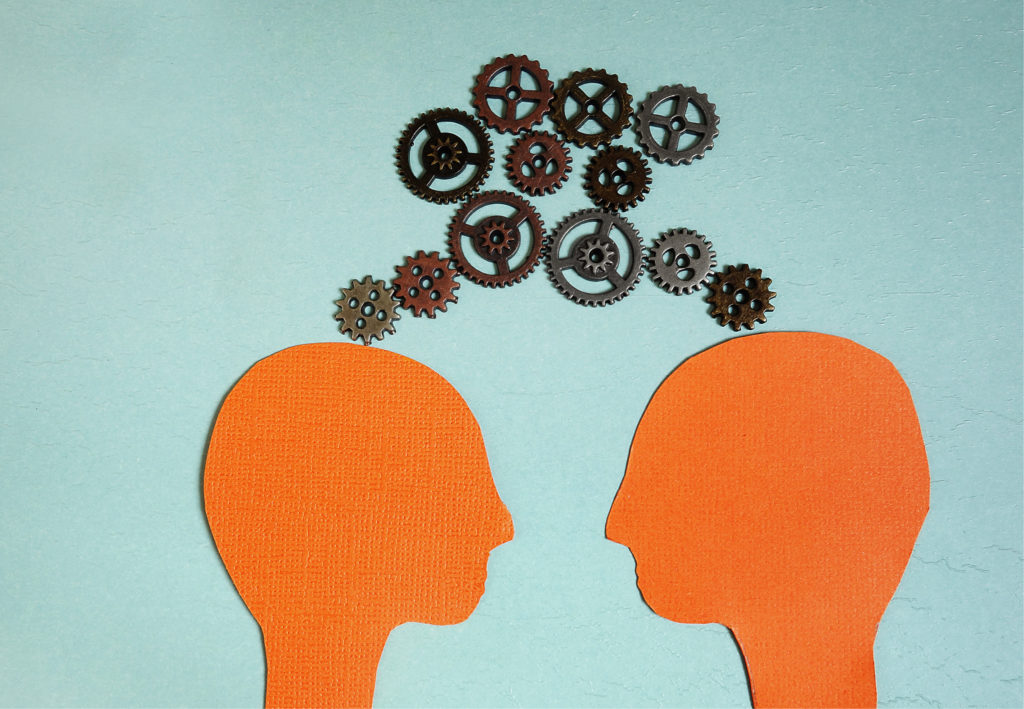Quick Hits
Daily brief research updates from the cognitive sciences

In case you didn’t know it brain synchronisation (or inter-brain synchronisation) is a thing. And a pretty cool thing. This happens when two, or more, people do similar things together and their brains sync up meaning that the firing patterns become very similar to each other.
This means that that feeling of being on the same wavelength is a feeling for the very good reason that you actually are on the same wavelength. I have written in more detail about this effect, which is important, because it also predicts many things. For example, when solving business types of tasks, brain synchronisation predicts how effectively a team will operate together. And also, how well they solve problems together. Similarly in audiences at concerts brain synchronisation predicts how well they enjoy it.
We could assume that this is related to how similar we are – with similar experiences and attitudes we are most likely to have brain synchronisation, but this piece of research shows that babies and adults playing together also show strong brain synchronisation.
Researchers at Princeton University set up the first experiment of this kind. It must be noted that measuring inter-brain synchrony is hard at the best of times due to its complexities i.e. measuring multiple brains and matching timing precisely. They managed by recruiting 42 children and using a technology called functional near-infrared spectroscopy (fNIRS) which measure blood flow similar to those pretty scans we often see.
However, 18 were too fidgety to give good readings and 3 flat out refused to wear the cap for measurement. That left 18 recordings.
Of interest is that in this study the same adult played with each child. Each child engaged in two scenarios: one playing with the adult, and another interacting with a parent while the other adult spoke to another person.
While the adult and child were playing brain synchronisation ramped up showing that similar processes were happening in their brains despite the large differences in age.
So, there you have it: parents when you play with your children you are getting on the same wavelength, and I am sure that is good for you.
For you business folk this is not just a random study, because inter-brain synchronisation is important for high performance in teams in business.
Here’s to syncing up!

Andy Habermacher
Andy is author of leading brains Review, Neuroleadership, and multiple other books. He has been intensively involved in writing and research into neuroleadership and is considered one of Europe’s leading experts. He is also a well-known public speaker speaking on the brain and human behaviour.
Andy is also a masters athlete (middle distance running) and competes regularly at international competitions (and holds a few national records in his age category).
Reference
Elise A. Piazza, Liat Hasenfratz, Uri Hasson, Casey Lew-Williams.
Infant and Adult Brains Are Coupled to the Dynamics of Natural Communication.
Psychological Science, 2019; 095679761987869
DOI: 10.1177/0956797619878698
More Quick Hits
Don’t Try to Change Minds – Change Behaviour
Don’t try to change minds, but simply change behaviour is the result a group of researchers have come to with regard to vaccinations.
Why Heat Makes Us Sleepy
Imagine if you are working and your stress levels are increasing, and then automatically soothing music is turned on to calm you down. Or alternatively if you are heading towards that after lunch dip of drowsiness and upbeat energetic music is turned on to energise you.
Tracking Mental States Through Your Skin – In Real Time
Imagine if you are working and your stress levels are increasing, and then automatically soothing music is turned on to calm you down. Or alternatively if you are heading towards that after lunch dip of drowsiness and upbeat energetic music is turned on to energise you.
Testosterone Promotes Cuddling
Quick HitsDaily brief research updates from the cognitive sciences es, you read the headline correctly. Testosterone considered the ultimate male hormone and often associated with aggression has had a bad rap. So, is all of this wrong? Well, the...
Online Learning Triggers Different Stress Responses
Quick HitsDaily brief research updates from the cognitive sciences ot so long ago all learning went online – out of necessity. There has been plenty pf research into differences in online learning and in-person learning but this study by Gellisch...
Use It Or Lose It – Mental Activity Reduces Dementia
Quick HitsDaily brief research updates from the cognitive sciences regularly write on which activities reduce risks of cognitive decline (just last week I reported on how your job can protect your mental abilites with age and also doing household...






